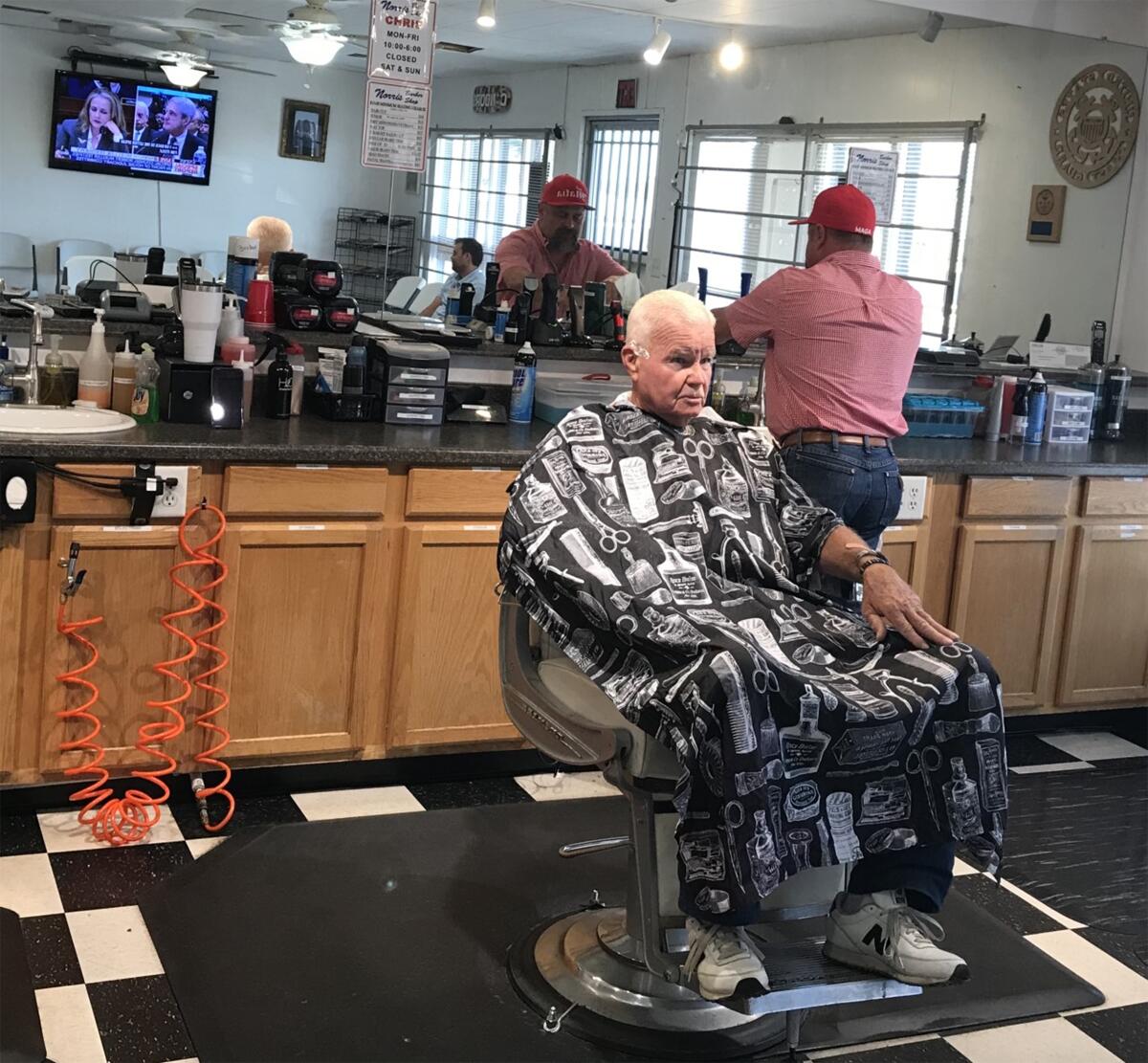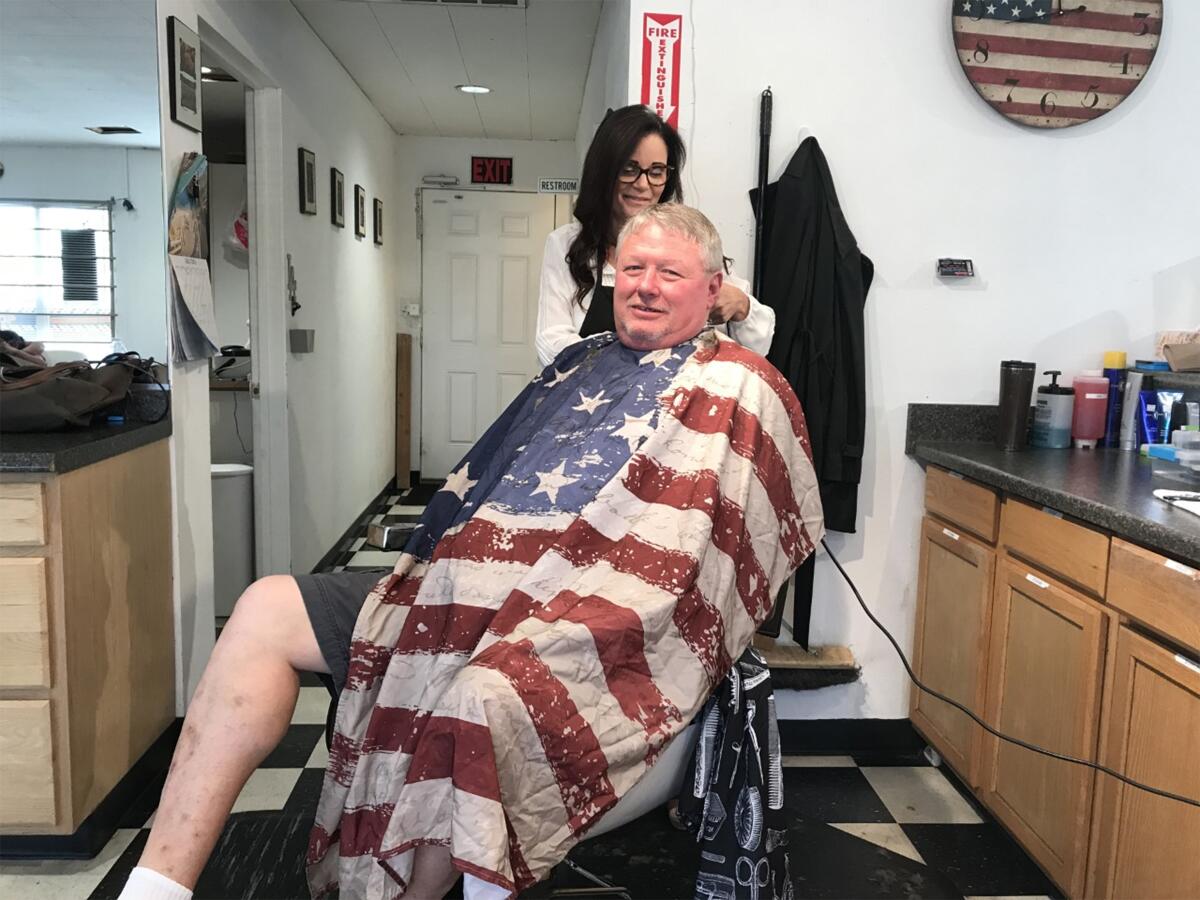Column: In tiny Oildale, the local barber, a Trump fan, has had it with California

OILDALE, Calif. — Chris Vaughn was wiping shaving cream off the tops of an older man’s ears when I arrived at his Oildale barbershop on Wednesday morning.
On a big TV along the back wall of the shop, former special counsel Robert S. Mueller was stumbling through his testimony to the House Intelligence Committee.
Vaughn wore a red baseball cap that said “red hat Mafia” on the front and “MAGA” on the back. His customer, a plumbing shop owner in his early 80s, stood up and removed the barber cape, revealing suspenders with an American flag motif.
“Why don’t they spend time fixing our country?” Vaughn said. “This attempt to make people not like Trump is a waste. Mueller looks like he has Alzheimer’s.”
The freshly shaven man paid Vaughn. “Y’all enjoy this crap!” he said cheerfully, gesturing to the TV as he walked outside into the already blistering heat.
As Republican Rep. Devin Nunes of Tulare, Calif., welcomed viewers to “the last gasp of the Russia collusion conspiracy theory,” Vaughn and I ducked into a back room, away from the sound of the TV and blasts from the compressed air nozzles his barbers use to blow snippets of hair from customers’ necks.
I was tired of the liberal bubble. I know what people are going to say before they open their mouths. I wanted to spend time in a conservative one, and maybe be surprised.
Vaughn and I chatted about politics, and what it’s like to live in Oildale, an unincorporated community in Kern County just north of Bakersfield that is overwhelmingly white and pro-Trump in deep blue, increasingly diverse California.
Oildale, with a population of about 32,000, is famous for being the birthplace of Merle Haggard and for the massive oil patch that drew Dust Bowl migrants west. It is also known for its intractable poverty, drug problems and a legacy of racism against blacks. Its population is 86.7% white. (Bakersfield’s white population is 67.5%.)
“I have a very clear view of politics,” said Vaughn, who is a Republican. “Either you are moral or you are not.” He hesitated. “Moral — meaning what you do in office. Personally, I don’t care about Donald Trump’s personal life.”
::

Vaughn opened Norris Barbershop, named for the street it sits on, nine years ago. Before that, he’d spent eight years in the U.S. Coast Guard and had a good job selling ads for Yellowbook, the local directory, until the economy cratered in 2008 and he was let go.
“I ran right to the Bakersfield Barber College,” he said. He attended school from 8 a.m. to 5 p.m., then went to work in a wrecking yard from 1 to 7 a.m.
Turns out, an interest in cosmetology runs in his family; a handful of relatives do nails or style hair. “I didn’t realize how artistic I was until I started cutting hair,” he told me. “I am good at fixing really bad haircuts.”
He began advertising his shop on a local right-wing talk radio station, a big expense for a small business that charges only $16 per haircut. But he feels it paid off. “Conservative radio built this business,” he said. Not only did his shop get a boost, but sometimes the hosts would put him on the air to talk politics.
“There are not that many conservative shops in Bakersfield anymore,” he said. “You won’t come in here and find people with sagging pants, smoking dope, drinking alcohol. You can send your wife in and I guarantee no one is going to bother her or make her feel uncomfortable. I’m a family shop.”
When I asked him if there was a racial undertone to that comment, he insisted there was not. “I am talking about culture, not race,” he said. “Culture is not skin tone. My generation is the Beastie Boys generation. That started the whole big clothing thing. I had enough respect not to show my underwear or my butt walking down the street.”
Like a lot of people, Vaughn uses his own lack of personal animus to ignore or deny the reality and effects of systemic racism. He welcomes all races to his shop, and recently hired a barber who also speaks Spanish. The Muslim man who runs the vape store next door is a friend.
But when I pointed out that research shows black and brown students can sometimes receive harsher punishment than white kids, he scoffed.
When I noted that black Americans have not had the chance — because of practices like redlining and real estate covenants — to build intergenerational wealth, he said, “Are you kidding me? Maybe 40 years ago, but today, not even close. My grandparents picked cotton and lived on a dirt floor. I never owned a black slave. My grandparents never owned a black slave.”
When I told him I am often aware of the privilege that my white skin affords me, he sounded incredulous: “How?”
Well, I said, as a minor example, no one follows me around in stores and probably no one follows you around.
“That’s cultural,” he said. “Maybe I won’t get a fair interview with you because I am wearing a red shirt and a red hat.”
::
Vaughn has decided he’s done with California.
Once he and his wife, Dawn, sell their home, he will hand the barbershop keys over to his longtime colleague, Danika Jeter, and move to Prescott, Ariz., a place with perfect weather, and a population that is 93.5% white.
“I’ve watched California turn into a cesspool,” he said. “The homeless population, the mismanagement of funds. The laws they pass are ridiculous. The plastic straw ban is stupid.”
To him, Arizona feels like “it’s America again. People keep to themselves, they have morals, they are respectful. They don’t have stupid laws. There is no graffiti,” he said. “I know it’s going to be better.”
I hope he finds peace in Arizona.
Before I hopped on Highway 99 for home, I took a drive through the oil fields. Thousands of pumpjacks bucked like broncos on miles and miles of moonscape. It was an awesome and strange sight.
Two hours later, I was home, happy to be back in my bubble, and ever more aware of Donald Trump’s powerful appeal to working-class white people.
More to Read
Sign up for Essential California
The most important California stories and recommendations in your inbox every morning.
You may occasionally receive promotional content from the Los Angeles Times.











